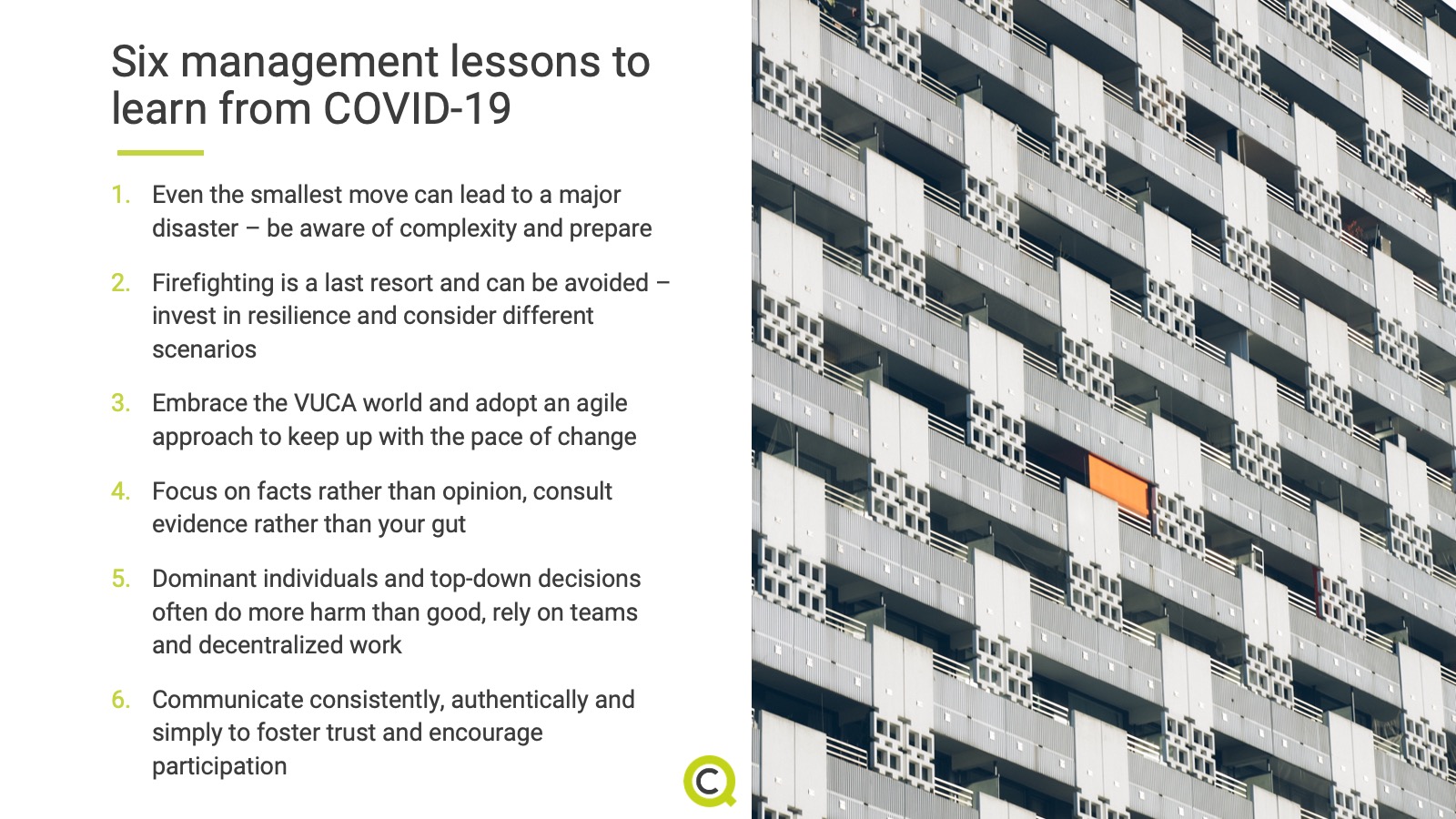- Blog
- Lessons learnt from Covid-19
Contents
- Management knowledge is useful amidst the pandemic
- From a management perspective, we are facing three major challenges
- Change: how can we manage dramatic change?
- Complexity: how can we solve complex problems?
- Leadership: how can we lead in a state of emergency?
- There is no one-size-fits-all solution to mitigate the crisis
- Six lessons allow for a cautious look ahead
Management knowledge is useful amidst the pandemic
When there is not a lot to hold on to, it makes sense to re-evaluate what skills and knowledge we do have that could at least provide as much as a framework to help us make sense of what is going on. In turn, we can use a framework to help us make a rough sketch for the future to give us some direction amidst the blur of insecurity.
Management tools are essential in situations like these, where the question emerges how to mitigate and deal with the crisis. Management is none other than organizing, delegating, and strategically shifting pieces on a chess board to achieve a desired outcome. In many spheres, people are asking themselves the same question: what can I do to get through the crisis? What can I do to make sure this doesn’t happen again?
From a management perspective, we are facing three major challenges
Taking a management perspective, the crisis puts us (individuals, teams, organizations, governments, nations…) before three major challenges:
- How can we manage dramatic change?
- How can we solve complex problems?
- How can we lead in a state of emergency?
Now that we have had several weeks of experience in observing how the crisis has affected different groups in different contexts, it is possible to cautiously derive some first lessons learned from the crisis: lessons we should remember for times to come and that might give us security when thinking ahead about what to do next.
The three challenges in the fields of change, complexity and leadership provide a rough framework along which we can think when asking what the crisis has taught us until now and what we can learn from it.
Change: how can we manage dramatic change?
Don't put all eggs in one basket and be prepared for unforeseen outcomes.
Even the smallest move can lead to a major disaster
The coronavirus grows exponentially in terms of infections. This means that one the growth process takes off properly, it will stretch every structure and system we know beyond its limits. Healthcare systems across the globe are already experiencing the consequences of the absolute surge in numbers of infected people desperately needing intensive care.
Exponential consequences are also relevant for projects in organizations or even for entire markets. Once a certain dynamic begins, it can easily snowball and take on an unprecedented size. For example, if you are facing a deadline and things don’t work out as time is running out, the project will end up collapsing, which in turn has larger repercussions. Even small occurrences can have major, major outcomes.
What can be done?
- Keep in mind that every small move will impact the bigger picture in and around organizations are inter
- Take seriously and manage deviations from plans as early as possible
- Consult change management models that consider complexity rather than linear progresses
- Plan for countermeasures for different stages of project implementation
- Encourage a speak-up culture amongst team members and co-workers to see and act on potential pitfalls
Firefighting is a last resort and can be avoided by resilience
When you are sitting in a plane, you are probably more comfortable knowing that there is a qualified pilot flying than knowing that autopilot is on. In management, positive aircraft control refers to a “pilot flying the plane, rather than the plane flying the pilot”. This means that as an actor in a system, like an organization, it is important to keep in control and to take responsibility for what happens (you do not have to be in a management position for that!)
Some countries seem to have lost control of the Covid-19 situation and have switched to firefighting mode: they are trying to put out the fire with all means possible. However, much of this fighting could have been avoided through early recognition of the problem, careful planning, and big-scale, drastic changes or initiatives implemented early on.
For organizations, this is a vital lesson: planning and preparation pay off and make organizations resilient, even if you cannot be 100% sure that the situation you are planning for will occur. Firefighting will always be the most expensive option and brings trade-offs like lack of quality of decision-making, lack of long-term perspective, or unnecessary externalities.
What can be done?
- Have early warning mechanisms in place that allow for quick action and communication
- Invest in and hone skills that foster skills like observation, risk analysis, change management
- Develop and consider different scenarios – make strategies based on them and re-evaluate them as your situation changes
- Be realistic: not everything is under your control. Sometimes fire will break out nonetheless – be prepared for that too.
Complexity: how can we solve complex problems?
Find your way through unpredictability using proven methods.
Embrace the VUCA world and adopt an agile approach
The outbreak of the Coronavirus took the world by surprise. In only a matter of weeks, an unprecedented state of exception has developed across the globe - some countries have even gone so far as to declare states of emergency. Unpredictable and sudden change like this is a characteristic of a VUCA world – a world that is volatile, uncertain, complex, and ambiguous. In other words, even if we believe that we can predict everything, this situation has taught us that we can never be 100% sure of what will happen, no matter how much we think we know.
In management, a VUCA world is best managed by adopting an agile approach. Broadly summed up, this means evaluating the situation, acting on it, evaluating the results, and re-evaluating the situation. This so-called OODA loop (observe, orient, decide, act) is helpful in that is allows us to take things step by step, and in that it encourages reflection and constant revising as the situation changes.
Many organizations are far from an agile approach, instead relying on frameworks that promise “if you do X, Y will happen”. Agility teaches us that everything is a complex process and the best way to navigate it is to take small steps and stay critical.
What can be done?
- Keep in mind the organization’s vision when strategizing and refer to it frequently
- Be open to learning from mistakes and make better decisions based on what you have learnt
- Establish KPIs (key performance indicators) on which to base re-evaluation
- Encourage autonomy and self-determination among others to diversify ideas and opinions
Focus on facts rather than opinion
In situations where we do not have all the facts and there are many unknown factors, is tempting to rely on opinions of people who have years and years of experience. It is equally as tempting to follow your gut when making major decisions. The Covid-19 crisis has shown the battle of science versus opinion clearly.
However, situations like the pandemic remind us that especially when there is a lot at stake, it is immensely beneficial to consult scientific evidence and to rely on the validity of the scientific model (testing hypotheses). Even if there are many unknown factors, established trends and theories can provide a useful framework for navigation. Also management knowledge, which is highly transferable, tends to rely on anecdotal knowledge.
Proponents of evidence-based management would argue that just as is the case with medicine, decisions can benefit from the bulk of scientific knowledge available that builds on experiments, case studies, surveys, etc. Would you rather take a medicine that has been tested and approved, or one that you have heard will help with your symptoms? Although there is not a lot of scientific evidence available yet on how organizations can cope with the pandemic and its outcomes, we can use evidence-based management to guide our decisions during this difficult phase.
What can be done?
- Before you make a decision, make use of the best evidence you can find. Take the time to find and understand results of scientific studies and apply them to your context
- Systematically make decisions: people are influenced by biases, prejudice and other factors. Select a decision-making strategy and stick to it.
- Be open to change: just as science constantly makes new discoveries, management knowledge is evolving. Stay up to date and never stop questioning.
Leadership: how can we lead in a state of emergency?
Don't try and steer the ship alone but dip in to the power of the people.
Dominant individuals and top-down decisions often do more harm than good
When taking a political look at the effects of the Corona pandemic around the world, it becomes obvious that some individuals use this crisis for personal gain. Just like in a government, any organization who has a strong leader with whom power resides is at the mercy of this person, also in a crisis. Once this dynamic has taken root, it is extremely difficult to break out. Even if you are not in a management position, taking into account the expertise of the crowd is crucial in ensuring that action is taken quickly and in an all-encompassing way.
Particularly in a VUCA world, evidence has increasingly shown the benefit of working in a decentralized manner, for example in decentralized teams or in non-hierarchical settings. Even during the Corona-crisis, the decentralised and individual action of medical testing labs has allowed for fast action and results, rather than having to wait for centralised and coordinated action from above.
Generally, teams with diverse opinions yield better and more robust outcomes than individuals. Beyond that, nurturing autonomy and self-determination in yourself and others leads to happier, more productive and more committed work. In an organization, although people are in different positions, they are all in the same boat. Hence, every voice should count.
What can be done?
- Establish and settle on guidelines for decision-making
- No matter what position you are in: lead so that others will be inspired and empowered, rather than intimidated and scared
- Encourage learning and skill-building, take part in offers wherever possible
- Never stop communicating openly and honestly
Communicate consistently, authentically and simply
One of the dangers of being confronted with a complex situation is that the language used to speak about it is equally as complex and therefore becomes incomprehensible. For some, complicated language is even a tactical tool to confuse people or shift their attention away from what really matters. Again, the current pandemic is a prime example of how leaders shape public opinion and sentiment through language. Language indeed shapes reality: even speaking of a "crisis" and "emergency" paints a different picture than speaking of a "healthcare challenge".
Most things can and should be broken down into easy and clear language in order to ensure that even complex matters are understood by many. This does not only have the benefit of clarity, but also ensures that everyone is on the same page and that everyone can take part in the discussion, even though they might lack the big words for it.
At the same time, phrasing complex matters in simple terms helps break down problems to their core and focus on what really matters. In firms or businesses, just like in politics, simple and authentic language, used in a consistent and regular manner, will create trust and encourage participation in decision-making. This, in turn, helps establish a healthy organizational culture, which has positive effects on performance and output.
What can be done?
- Ensure everyone is always up to date and informed about new developments and has a say in them
- Foster an environment of dialogue, in which communication is interactive and flows in two directions
- Invest in measures that encourage team building, trust, and openness to ensure the organizational environment is psychologically safe
- Establish communication rituals like team meetings, phone calls or common activities that become the arena for exchange
There is no one-size-fits-all solution to mitigate the crisis
The crisis has only just begun and is symptomatic of many more complex and systemic issues that will face the world in the long-term. As members of organizations and contributors to the economy, in whatever way, it is important to remember that every context is unique. There is no one-size-fits-all solution that can help us get through the crisis and we simply know too little about how the situation will develop to make any long-term decisions.
However, what we do know is that there are certain trends that have emerged in how the world has reacted to the pandemic, that allow us to consider what we can do better in the future. Of course, it is unclear what this future will look like.
Six lessons allow for a cautious look ahead
Looking at the six lessons learned, it seems that we must prepare for a future that is uncertain, complex, and we will need to plan ahead carefully and consult robust sources as well as the so-called “hive” mind to make the best of it. While only some organizations or individuals will be in the situation to implement changes now, others will need to re-align and re-evaluate altogether and wait for the immediate effects of the crisis to be over.
Arguably, these lessons learnt are not only valuable to organizations, but they could also benefit political actors. While for many of us we can only use this situation to wait and hope for the best, we can and should nonetheless not shy away from making changes where possible and from planning ahead cautiously. The pandemic is a durability test for many people and systems, and may not be the last of large-scale disruptions we will need to face.
Tags: VUCATop Rated
About the Author

Comments
Most Read Articles
Blog Categories
RELATED SERVICES










Add comment